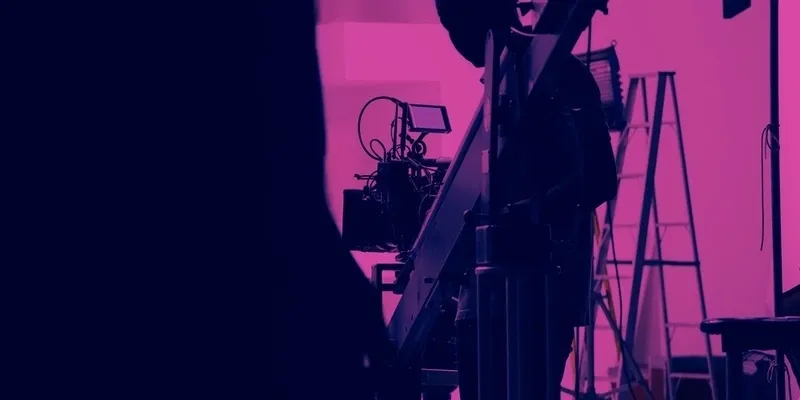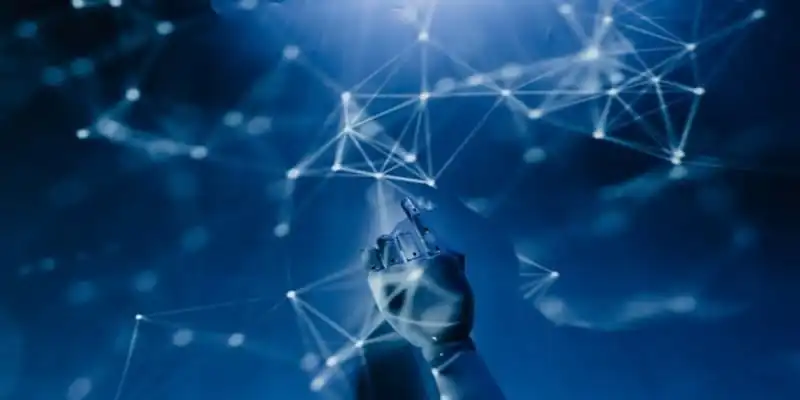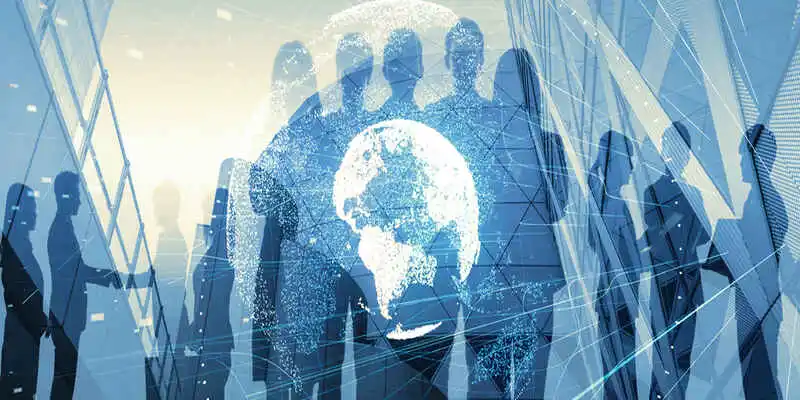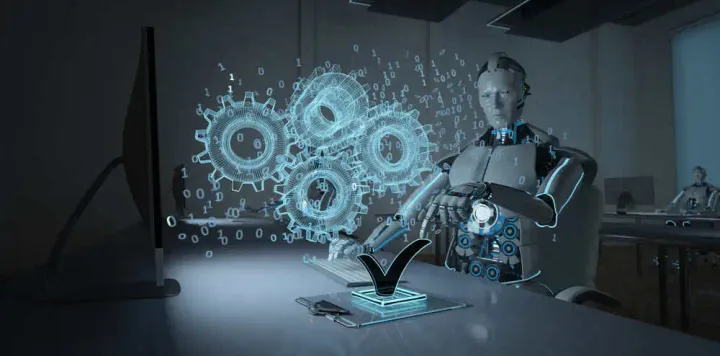AI in Filmmaking: An Era of Creativity and Challenges
The innovative rise of AI in filmmaking is no exception now. From pre- to post-production, AI can enhance creativity, deliver visually stunning results, and streamline production processes. With the increasing role of AI in the film industry, the article also addresses its ethical concerns.

AI in filmmaking has emerged as an interesting era in the last few years. Just imagine a situation when it will be difficult to decide where human intelligence ends and where the possibilities of technological breakthroughs start. Now multiple AIs write the script, characters are depicted with the utmost realism and sequences in a few seconds. This is how AI movie production works, and the process still has a long way to go. Starting from script, shooting, sound, and editing to coloring, marketing, and distribution –AI is soon going to become the weft and warp of filmmaking. It provides the directors an opportunity to explore new areas of creativity, enhance working conditions, and give the viewers beautiful displays.
Back in July 2023, a U.S. survey was conducted about the use of AI in the TV and film industry. In the survey, 42% of respondents support the use of AI in films to modify actor's appearances and to create special effects. Apart from that, 38% of respondents support the use of AI for animated characters' voices. So, it’s evident that AI in filmmaking is experiencing an incredibly dynamic development, thanks to the constant evolution of artificial intelligence. From pre to post-production phases, AI is making its way to the set and every other phase of movie production, promising wonders and obstacles. This article aims to analyze the possibilities AI has brought to the movie industry while reviewing its strengths and weaknesses and the ethical issues attached to it. So let’s discover!
Understanding the Use of AI in Filmmaking
AI is everywhere. It almost engulfed every industry with its innovative concepts and ideas. Keeping that in mind, AI’s involvement in the film industry is not a surprise. It's not like robots or mind-reading machines will take over the jobs. Rather, it's all about how we can modify and revolutionize the way of telling stories to people.
AI in filmmaking can help engage the audience better. Additionally, it can also help in more film production and distribution as well. So, in terms of filmmaking, AI is not going to change or replace the cast's talent or the director's creativity. Rather, it helps in ensuring their capabilities to achieve more.
Here are some areas where AI can help in improving film production;
- Script Writing and Analysis
- Improved Visual Effects
- Location Scouting and Cast Selection
- Marketing
- Movie Productions
- Movie Editing through AI
Script Writing and Analysis: Choosing the right script for film success and revenue generation is very important. So, with the use of AI, filmmakers can now generate unique scripts. By feeding the AI models with the data related to movie scripts, the machine learning algorithms help in analyzing the data and thus emerge with unique scripts. By doing so, the filmmaking process would be much easier and resource-efficient. Additionally, AI can analyze hundreds of scripts using Deep Learning technology to declare their possible success or failure. Due to this capability, scriptwriters can refine their scripts; hence, the producers can augment their decision-making process.
Improved Visual Effects: With a little touch of AI, creators can be at ease by getting stunning visual effects that can be pleasing to their eyes. So, by using AI in filmmaking, one can reduce the need for high-quality, expensive equipment, a big workforce, or even big studios.
Location Scouting and Actors Selection: In terms of casting and actor selection, AI can also do wonders. By writing authentic image descriptions along with specifying criteria, AI platforms can look into their database for such actors since the AI models are fed up with a giant amount of data. The data contains the descriptions of the facial features of actors along with several emotions. The engraved algorithms can help in overlaying the digital face of the actor while retaining the natural expressions of the original performer. So, like this, AI can be used in selecting actors digitally in multiple emotions. AI can even de-age the actors for specific roles.
Furthermore, filmmakers can also benefit from AI to even create digital characters for their films. For example, one of the fictional supervillains named “Thanos form Avengers: Infinity War” was the one which was designed through machine learning technology.
AI can also help streamline the process by predicting the next superstars and multiple spotting trends. Additionally, in film, AI can support scouting the location by predicting weather forecasts, logistics measures, and crowd control to guarantee a smooth shooting process.
Marketing: AI can greatly help tailor film marketing strategies by analyzing audience data. It can predict which poster design will attract the audience's attention or which trailer will be a possible hit.
Movie Productions: While AI can greatly enhance multiple aspects of film, AI can also create its movie. For instance, in collaboration with Ross Goodwin, Benjamin AI created a Sci-Fi movie named “Zone Out” in barely 48 hours. So, it's a step towards impressive and challenging automated video creation through AI technology. Considering the example, we can say that the use of AI can save a lot of resources and time to improve the overall filmmaking process for higher revenues.
Movie Editing through AI: When it comes to editing, AI can greatly help. Movie editors can utilize AI systems and algorithms to generate film trailers. The engraved algorithm can help the editor bring out action-based and emotion-based scenes to generate tempting trailers.
An example of AI movie editing is the "IBM Watson Program." It was used to generate a trailer for one of the sci-fi films named “Morgan." Additionally, Film editors can fully utilize the power of AI even to edit full-length films. It can be possible through AI Algorithms by using facial recognition technology to figure out the main protagonists and scenes. By doing so, it can assist the editors in editing full-length movies.
AI in Pre-Production
The pre-production phase is considered the most labor-demanding part. But now, with the help of AI, filmmakers can streamline this domain quickly. In terms of pre-production, AI can help in the following ways, thus enabling filmmakers to draw better storylines.
Scriptwriting and Storyboarding
- AI-Generated Scripts Analysis: With the help of AI algorithms, one can analyze the vast data sets containing numbers of existing scripts and stories and then develop new ideas for plots, scenarios, or dialogues. For instance, a sci-fi movie database can be provided to AI tools, which will suggest possible story ideas for a sci-fi movie. Furthermore, in terms of time, AI systems can perform complex tasks such as detailed analysis of scripts in just a few minutes. The AI-based analysis might include;
- Character introduction
- Plot identification
- Conflict progression
In script analysis, AI can also help in identifying those particular potential elements or characters that could help in increasing the possibility of film success. By analyzing these aspects, AI can greatly help writers generate foolproof scripts. Apart from all these possibilities, another major progress of AI in filmmaking is the development of AI scriptwriting software. This software is not capable of just analyzing pre-based content. Rather, they can generate new content and multiple techniques, such as stylistic imitations and narrative arc mapping. This can help to create drafts that feel generated by humans.
“Studiovity” Software for Pre-Production
One of the best AI software for pre-production is Studiovity. It greatly helps in script breakdown, which is considered the most time-consuming part. Studiovity's AI-driven script breakdown features help in automating tasks 10x faster than humans. The key features of this software include;
- Automation – To streamline workflow, it can easily tag wardrobe, props, and much more.
- In-Depth Notes – It can import the original shooting scripts and then add details to the scenes where required.
- Comprehensive Reports – The software can generate full script breakdown reports within no time.
So, this Studiovity tool enhances the workflows and thus makes the pre-production process even more accurate and faster.
- Storyboarding and Previsualization: Traditionally, we have seen the storyboarding stage as a time-consuming task. It even takes months to finalize the process. AI, however, helps in such tasks as storyboarding that can help create visual representations of shots and scenes before shooting. This can help the filmmaker turn the ideas in their head into realistic images and can also see potential issues with the script. So, AI can help in rapid prototyping.
In terms of previsualization, AI-based software can generate multiple lifelike animations. It can help producers, production designers, and directors to visualize the scene before a shot.
Additionally, the algorithms can also help in designing 3D environments and modeling different movements of the actors within a particular environment. By doing so, producers can save time by reducing back-and-forth problems in the early stages of production. It can also help to plan better shots and lighting setups as well.
- Benefits and Limitations of AI-Assisted Creative Processes: In addition, we find it helpful to look to artificial intelligence for support, yet it is crucial not to forget the significance of creativity. Stories written by AI have limited resemblance to real lives and are less convincing. Emotions cannot be explained in simple terms, so such content will not be able to pull heartstrings in the same way.
For example, a script may be produced by artificial intelligence, and it's logical, but it does not have the passion of the real scriptwriter. This means that it is important for AI to be seen and used as a means to enhance creativity as opposed to acting as a substitute for such.
However, despite these concerns, we have seen some successful examples of AI-generated scripts. For instance, in 2016, one of the AI algorithms named Benjamin wrote a short AI film called “Sunspring." At that time, the film's script was nonsensical, but it showed the potential of AI to contribute to the creative process of AI-based filmmaking.
Casting and Character Development
- AI-driven Character Analysis and Development: Similarly, AI can help analyze the script for various character arcs, motivations, and even the dynamics of relationships between actors. For example, an AI tool might be used to determine the main efforts of the main character and the protagonist’s dilemmas. This may assist the actors in developing more physical insight into the characters they portray and, therefore, create better performances.
Moreover, AI in casting can also help directors analyze the vast database of actors and find fresh talent. An example of the use of AI in casting is one of the movies, “Ex Machina”. In this move, the AI-based algorithm “Ava” was cast. With the ability to display human-like expressions and behavior, the algorithm outperformed the film, thus showcasing the potential of AI in casting.
Location Scouting and Set Design
- AI-powered Virtual Location Scouting and Set Design Tools: AI can consider huge amounts of locations' datasets, considering several factors like climate, geography, and availability. For instance, an AI tool may locate a site with desirable characteristics, such as a desert containing certain rocks. Further, it is possible to utilize AI to produce virtual scenes, so there is no need to build all of them in real life, which will positively impact the environment.
AI in Post-Production
Just like in film and pre-production, AI can do wonders. Likewise, it can evolve in the post-production stage, thus enhancing output quality and streamlining processes. So, let's explore the innovations AI can bring in the post-production era of filmmaking.
Sound Designs
AI-Based Sound Improvements: AI has also stepped out with innovative solutions in sound design. It is going to outperform the sound-making process of films. Sonic analysts now implement AI algorithms to build 3D soundscapes, or they can completely duplicate specific auditory settings. This innovative technology can replicate sound designs, thus helping sound editors to expand their creativity. AI algorithms can help in innovating sound in the following domains;
- Speech Improvement: When it comes to complex field recordings in several documentaries or reality settings, AI can improve the clarity of sounds and speech.
- Noise Subdual: AI can help detect unwanted noise to ensure the clarity of dialogues and sound effects, which results in guaranteeing smooth post-production.
- Sound Fusion: AI algorithms can help generate multiple sounds. They can also modulate the sounds based on the inputs to raise the game in sound designs.
Computer Graphics (CG) and Visual Effects (VFX)
- CGI Character Creation: CGI and animation processes can thus be optimized by employing artificial intelligence algorithms in tasks like texture, material, and environment generation. This, in turn, relieves the artists to focus on the creative aspects of their work. So, with AI, creating difficult CGI characters can be easy by making wise decisions based on datasets.
- Realistic simulations: In organization development, AI can produce plausible recreations of natural processes, including weather, fire, and water. This can improve the aesthetic experiences of films and make them more realistic.
- VFX Enhancements: AI algorithms can precisely track and composite. So AI can enable artists to create detailed and realistic special effects.
AI-Powered Editing Tools and Automation
- Automated Editing: Some AI editing tools can even mitigate the process of searching for the best shot, selecting and removing unnecessary ones, and even color-correcting scenes. This can make the editing easier and, therefore, take less time than traditional methods.
- Intelligent Editing Assistants: Such tools will assist the editors in making better decisions, given that the recommendations are based on statistics and machine learning. For instance, it is possible to assign a tool that would recommend a particular cut based on the mood of the scene.
Color Grading and Correction
- Color Grading Automation: Using AI and machine learning, one can feed a clip/ video, and the AI will help recommend the right color grading settings to get the right look. This can assist filmmakers in producing aesthetic and sequential films. Moreover, AI can also help maintain color consistency. It can automatically apply the same colors to similar shots by analyzing the previous color palettes for such shots or sequences.
- Color Predictions: AI can predict colors by analyzing the director's previous choice. Thus, it can reduce the maximum efforts and enhance productivity.
There have been various successful examples of AI-assisted procedures in the post-production process. For example, in the AI-assisted “Blade Runner 2049” movie, the visual effects were enhanced through AI algorithms. The algorithms can generate realistic CGI elements that match the aesthetics of the original Blade Runner movie.
Use Cases of AI in Filmmaking
In today’s film industry, AI is not just a concept but a reality. Here are the real examples where AI has been well used.
1. Film “Morgan”
Morgan is a horror-based sci-fi AI film. It stands out as the evidence of the AI's capabilities in film production. In this movie, Artificial intelligence was used both behind and in front of the screens. Even the trailer of the film was created with the help of AI.
2. Film “Disney’s the Jungle Book”
Another great example is the use of AI in Disney’s Jungle Book. The film's sets were created through the photo-real rendering technique, which became possible through AI. The film became a huge global hit due to its outstanding visuals.
AI plays an exciting role in film production, combining creativity and technology. It can shape the film industry's future by enhancing storytelling and audience engagement. Moreover, AI's potential is growing in this industry, and it's set to give filmmaking art a new life.
AI in Filmmaking: Emerging Trends and Technologies
- AI-Generated Actors and Virtual Characters: Thus, AI technology will steadily develop as AI-generated actors appear with AI virtual characters. This might also lead to new realism and forms of representation and, thus, new narratives in cinema.
- AI-Powered Audience Analysis and Personalization: AI can also help identify the audience and their related preferences when watching content. Such information can be applied to customize content and, thus, optimize target viewers' experiences.
- New Storytelling Possibilities and Artistic Expressions: AI can help directors and other moviemakers enrich their ideas about storytelling and try out new strategies. In this way, AI can help filmmakers minimize and delegate time-consuming tasks and won't limit creative development in filming.
Ethical Considerations and Challenges
- Algorithmic Biases: Machine learning is based on data sets that can be authoritarian. These biases can also be conveyed to the AI systems; hence, the produced films contain discriminated representations. These discriminations lead to certain biases, which can be harmful.
- Potential Job Losses in Traditional roles: Another issue of concern linked to the applications of AI in filmmaking is job losses. The use of AI incorporates roles that were formerly performed by human skills; the result could be that the machine shall do skills involved in editing, visuals, and sounds.
AI in Filmmaking: A Look into the Future
- Economic Opportunities Created by AI-driven Innovation: At the same time, AI, which introduced significant changes, also opens up new opportunities to create new sources of economic income. These AI tools and technologies will often be developed and implemented, resulting in new jobs and careers. For instance, skills in the development of artificial intelligence, such as AI engineers and data scientists, will be in demand as the movie industry integrates the use of advanced technologies such as AI.
- Balancing Creativity and Technology: In the further development of AI technologies in filmmaking, they have to overcome the judgment and creativity threshold for this purpose. It is necessary to recognize that AI should become the servant to human creativity and not the opposite.
- Addressing Ethical Concerns and Ensuring Responsible AI Use: To summarize, several ethical issues are connected with artificial intelligence, and it is vital to reach a reasonable use of this category. This entails providing policies that seek to control the use of AI, particularly in filmmaking.
Conclusion
In conclusion, AI in filmmaking is going to do wonders. It will help filmmakers appreciate the opportunities and challenges of using the available technology to make ground-breaking films. However, AI brings many risks that need to be mitigated and ethical issues linked with topicality. In this way, one can guarantee that AI is indeed the tool for the creation and not the destruction of the numerous opportunities the film industry offers people.


